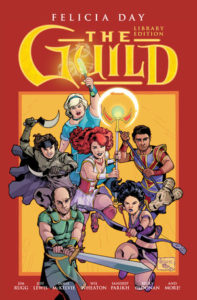 The Guild Library Edition Vol. 1
The Guild Library Edition Vol. 1
Publisher: Dark Horse
Writer(s): Felicia Day with Jeff Lewis, Sean Becker, Kim Evey, Sandeep Parikh, and Wil Wheaton
Artist: Various
Colorist: Various
Letterer: Nate Piekos & Clem Robins
Cover: Georges Jeanty with Dexter Vines & Tariq Hassan
Having never watched The Guild, I had no idea what to expect when I picked up the Library Edition collection. Devised as a stand-in for Season 0 of the web series, the introductory adventures of Codex, Vork, Clara, Zaboo, Bladezz, and Tinkerballa almost escaped me completely. I am, however, glad that I didn’t judge this book by it’s bright, yet unassuming cover. The narrative within is charged with wit, humor, and at times startling poignancy. It serves as a sterling example of how to animate a person that just happens to be a fictional entity. That the supporting cast is as similarly, though not quite as thoroughly, informed as the main protagonist only enriches this already engrossing universe of small instances .
Writer Felicia Day admits in the introduction that much of Cyd Sherman’s story is borrowed extensively from her own life and experience. As a mousy redhead, suffering from depression and social anxiety, the character stumbles into the world of online gaming as an escape from her everyday woes. She is undervalued at work and in her relationship, often isolated and unmotivated, with no distinct or viable path to fulfillment. From that personal investment radiates a wealth of honesty and vulnerability appreciated in any medium. Granted, she had collaborators on this substantial effort, but Day’s voice is singular and easily recognizable among their contributions. The only real deviations from the tone of her first issues come when another writer with a different objective is guiding the narrative. I would not say that these tonal shifts diminish the quality of the writing at all, just that there are noticeable differences in regard to pacing and intimacy with the material.
The Guild is the kind of book I wish I was smart enough to write. It is not built on a grand scale or larger than life spectacle. The value of the account is in its’ uneasy familiarity. There is no political intrigue or raging interstellar conflict to inflate urgency or tension. Instead, Day and company focus on the significance of the mundane, seemingly innocuous happenings of everyday life. Their regard for these occurrences subtly enhances the writing, and capitalizes on the tangibility they imbue upon character. The artwork, again the product of varied voices and techniques, provides superlative visual context, evincing the dissociative dynamic between the “real life” and the game world; between the actual prison of self and how we can view ourselves through idealized lenses of identity and self-objectification.
These characters aren’t just people hiding behind their avatars. Well, except maybe for Tinkerballa, she definitely relishes the anonymity. The others, however, are in fact emboldened into sharing the truest visions of themselves in a place where those identities are valuable. The disparity between that validation in the game and the indifference they experience in life solidifies their connection, and I believe it is the basis for The Guild’s appeal in general. Trust, this isn’t an involved, overwrought deconstruction. The material is handled with a surprising but appropriate levity. Overall, The Guild Library Edition is a hardcover compilation I would recommend without reservation.
Christian Davenport



